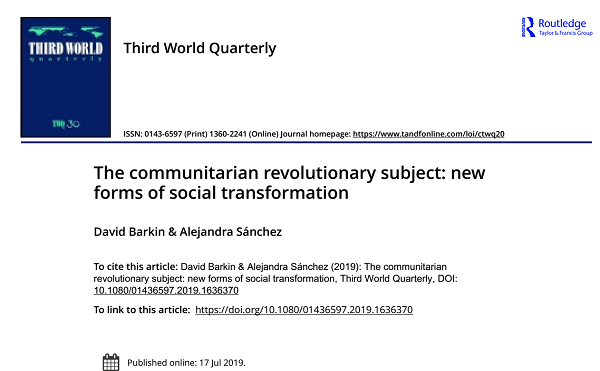First published on 07/17/2019, and last updated on 09/26/2019
The communitarian revolutionary subject: new forms of social transformation, by David Barkin and Alejandra Sánchez, Third World Quarterly, 17 July 2019.
David Barkin is a Distinguished university Professor at the universidad Autónoma Metropolitana in México City, an emeritus member of the National Research Council and an Honorary Member of ICCA Consortium. He is an ecological economist, and collaborates with post-capitalist societies to promote social well-being and environmental justice in Latin America.
Alejandra Sánchez is a doctoral student in economics at the universidad Autónoma Metropolitana in Mexico City. Her research in ecological economics focuses on indigenous communities in Mexico.
A word from the authors
As conceived in the research and the article, the “Revolutionary Communitarian Subject” offers a generalization of the direction in which many community members of the ICCA Consortium are moving towards. Most communities are painfully aware of the limitations of trying to move forward with their collective projects within the framework of today’s global market and the highly concentrated international trading system that channels benefits to the very wealthy and the largest corporations in the richest countries. As a result, communities around the world are strengthening their commitment to recuperate their cultural heritages and deepen their understanding of how best to restore and to assure the conservation of their environments while also improving their quality of life.
While the specific examples on which the article is based are drawn from Mexico, we think that the experience is relevant for advancing in thinking about constructive ways in which communities around the world might consolidate their own strategies for collective action. In Latin America, many of our colleagues consider it appropriate to think about this process as the construction of “Post-Capitalist Societies.” We would appreciate comments from our colleagues as to continue and broaden our work.
Abstract
The hope for a unique revolutionary actor in the XX Century evaporated as a result of the weaknesses of social organizations. This paper examines the potential of an almost forgotten group of revolutionary actors –collectively organized and deliberately involved in processes of social and productive transformation with a legitimate claim to territory– whose present-day activities involve them in concerted processes to consolidate a different constellation of societies on the margins of the global capitalist system.
Indigenous and peasant communities throughout the Americas are self-consciously restructuring their organizations and governance structures, taking control of territories they claimed for generations. They are also reorganizing production to generate surplus, assembling their members to take advantage of underutilized resources and peoples’ energies for improving their ability to raise living standards and assure environmental conservation and restoration.
These communities are not operating in isolation. They coordinate activities, share information, and build alliances. Hundreds of millions of people are participating in this growing movement; they occupy much more than one-quarter of the world’s land area. There is great potential for others to join them, expanding from the substantial areas where they are already operational. Global social networks are ensuring that this dynamic accelerates.
Read the full article here. It is also available in Spanish, please contact the author David Barkin to ask for it.
